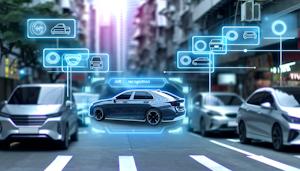 UseCasesFor.ai
UseCasesFor.ai
Choose Topic
 UseCasesFor.ai
UseCasesFor.ai
AI Use Cases
A collection of over 250 uses for artificial intelligence
A continually updated list exploring how different types of AI are used across various industries and AI disciplines,including generative AI use cases, banking AI use cases, AI use cases in healthcare, AI use cases in government, AI use cases in insurance, and more

Sign up
to receive a PDF containing all the use cases and stay updated with the latest AI trends and news (you can always unsubscribe)
Car make and model recognition

Introduction
Computer Vision (CV) Artificial Intelligence (AI) has transformed the automotive industry and related sectors through its ability to interpret visual inputs for car make and model recognition. Traditional methods often fall short in accuracy, especially in environments with high vehicle turnover or poor-quality imagery. CV AI overcomes these challenges using advanced machine learning algorithms trained on vast datasets, enabling precise identification of vehicle details in real-time. This innovation enhances efficiency, reduces errors, and streamlines processes in industries such as insurance, law enforcement, parking management, and automotive manufacturing. The benefits of CV AI are extensive. It boosts operational efficiency by quickly processing vehicle images, reduces costs through automation, and enhances customer satisfaction with accurate, rapid results. Applications extend beyond identification, offering insights like vehicle color and features. Industries leveraging CV AI report significant ROI through improved productivity, risk management, and competitive advantage. Real-world examples include AI-powered quality control in manufacturing, fraud detection in insurance, crime prevention in law enforcement, and enhanced ride-sharing and parking systems, showcasing the transformative potential of this technology.
Challenges
The use of CV AI in car make and model detection also comes with its own set of difficulties in the context of cars. The major challenge is the large number of car models available in the market. Due to the presence of a large number of car models across the thousands mark across the globe, it is a challenging task to design an AI system that can identify all of them. Another challenge is the image quality as poor lighting conditions and adverse weather conditions may impact the accuracy of the car model and make detection. Further, the pictures of the cars may be clicked from different angles which can also create a problem. There is also the issue of data privacy and security since such technology has the potential of violating the privacy of individuals. Finally, the expense of deploying and updating these intelligent systems makes it unaffordable to many companies.
AI Solutions
Despite these challenges, solutions with artificial intelligence have been found to be very effective in solving such problems. The most important of these is deep learning which is a branch of machine learning that implements neural networks with many levels of neurons to compute and interpret information. In the current world, many firms including OpenAI and Tesla are applying deep learning in teaching their AI systems to identify car makes and models. Another approach is the employment of convolutional neural networks (CNNs), which is especially useful for image recognition problems. These AI systems are trained with thousands of images of different car models in different conditions. Also, there are data augmentation strategies that include rotation, translation and flipping to enhance the variety of the training set and, therefore, the accuracy of the model. To overcome the problem of privacy some of the systems only identify car models and makes without having to capture license plates or other possibly sensitive details.
Benefits
There are numerous advantages of using CV AI for car make and model detection. Firstly, it increases the efficiency and effectiveness of various fields. For instance, in the insurance sector it facilitates efficient and accurate assessment of the damage, therefore reducing the time taken to process a claim. In the case of law enforcement, it helps in establishing ownership of stolen vehicles or even tracking of criminals. Secondly, it also plays a role in enhancing the level of service in the automotive sector particularly in the area of marketing and recommendations for specific car makes and models. Thirdly, it has the possible environmental advantage of being able to pinpoint vehicles that are damaging the environment. Lastly, it is a step in the right direction in the development of self-driving cars.
Return on Investment
The ROI of CV AI in identifying the make and model of a car can be high, but it can also be different based on the particular use of the AI. In the case of insurance companies, for instance, the improved efficiency in assessing damage and handling claims can reduce costs significantly. In the case of law enforcement, the enhanced ability to identify and recover stolen vehicles can lead to tremendous financial gains. In the case of automotive companies, the enhanced capability to offer targeted marketing and recommendations can result in higher sales and customer retention. Nevertheless, these advantages pose significant costs in terms of initial investment on AI and other related resources.